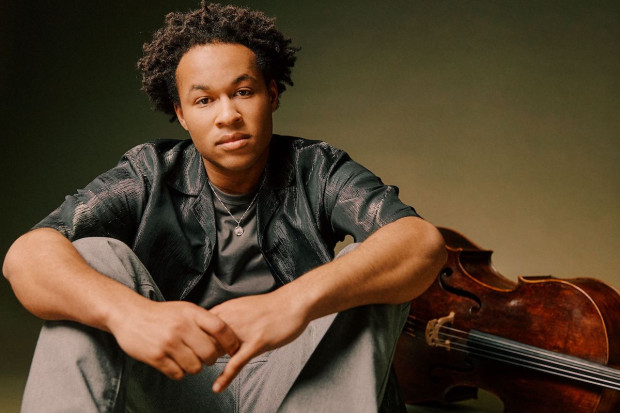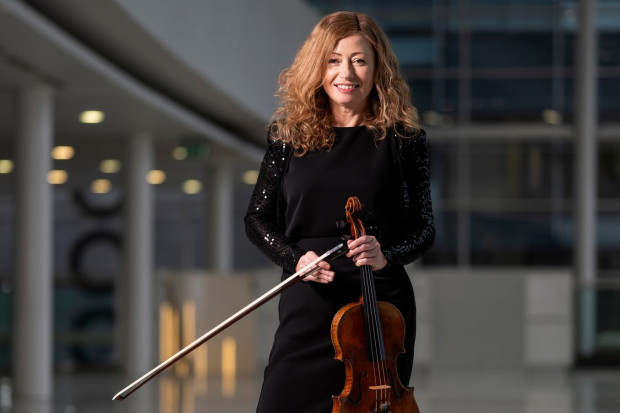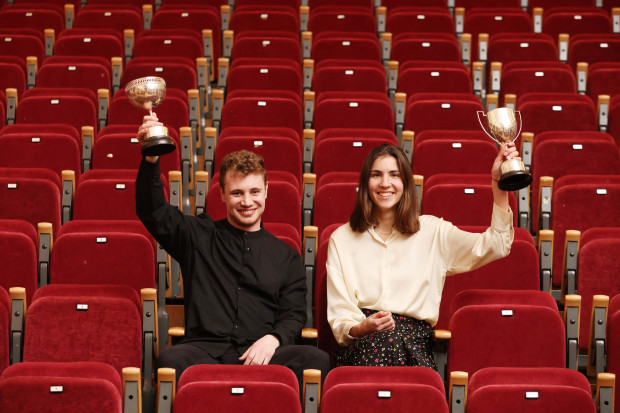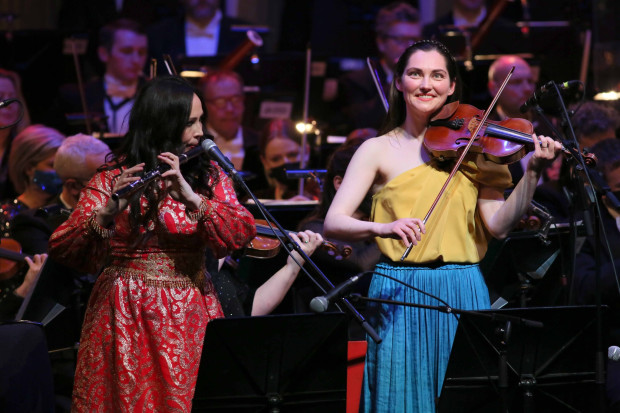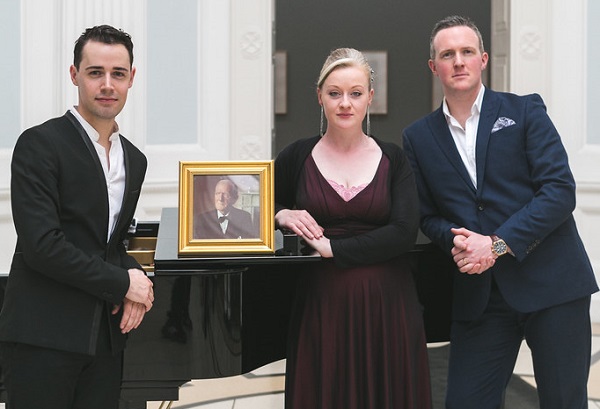
Niall Kinsella, Raphaela Mangan and Gavan Ring with a portrait of John F. Larchet.
Uncovering an Historical Irish Composer
John Larchet (1884–1967) is one of those figures who played an important role in the development of music in Ireland but whose own small output of music is not so well known today. In some ways, one could see this as the almost inevitable fate of the miniaturist, but despite the obscurity of much of his output a select few of his songs have remained in the local repertoire, sometimes heard sung by young singers in recitals or competitions or in recordings by Irish singers from John McCormack to Bernadette Greevy. McCormack’s recordings of ‘Padraic the Fiddiler’ (with Fritz Kreisler on violin) and ‘The Philosophy of Love’ are the most widely available of these, though it is notable that many transfers of the latter recording misattribute the song to Roger Quilter. This new disc, featuring Raphaela Mangan and Gavan Ring accompanied by Niall Kinsella, presents all of Larchet’s original songs for voice and piano along with some arrangements and nine of the sixteen songs on the disc are credited as premiere recordings. In addition Mia Cooper and Kinsella perform two sets of arrangements of Irish Airs for violin and piano which are also receiving their first recording on this CD.
A close contemporary of Hamilton Harty and pupil of Michele Esposito, Larchet played an important role in the development of a musical infrastructure in Ireland and as a teacher. He was an examiner for the Irish Department of Education, played a key role in the development of the Army School of Music and spent over two decades as music director at the Abbey Theatre. As teacher at the Royal Irish Academy of Music and UCD he numbered a considerable amount of the next generation of Irish composers among his pupils. Some of these, such as Frederick May, Seóirse Bodley and Joan Trimble gained their earliest grounding in composition with Larchet before continuing study abroad. Others such as Brian Boydell, Walter Beckett and Gerard Victory were indebted to him as one of their primary teachers. With so many different activities it is not surprising that Larchet’s output was small or that the dates of the songs suggest a sporadic approach to composition. On this CD the songs are presented roughly in chronological order allowing us to hear the development of his voice, though there is no dramatic alteration in style over the period from 1906 to 1955.
The disc begins with ‘The Philosophy of Love’ whose catchy melody and buoyant tone has helped to make it one of his more popular songs. By contrast the other three songs from this early period (1906–10) seem rather more foursquare with the composer resorting to redundant repetitions of text to fill out the conventional musical shape. Both ‘In Sweet Humility’ with its simple ABA form and ‘Love’s Question’, which follows a verse and refrain pattern decked out in sentimental chromaticism, summon up the image of the Edwardian drawing room, with careful shadowing of the vocal line by the piano at any awkward corners and grandstanding high notes at the end to gratify the amateur performer. ‘Love and a Garden’ is probably the weakest song on the disc. Its rather turgid repetitions of the verse do nothing to prepare one for the portentous ending (setting words such as ‘Through day, through night / I’ll keep it bright / Till God shall make it flower’) complete with concluding rumbling tremolandi on the piano, presumably designed to appeal to a taste in the Irish and British markets for a popular religiosity typified by such hits as ‘The Lost Chord’ or ‘The Holy City’.
Whatever about matters of changing taste, already one gets a sense of a relatively secure technique in these early songs despite the odd awkward moment, such as the return of the opening idea of ‘In Sweet Humility’ where Larchet tries to disguise the conventional nature of the move. However, the second group of songs, which brings us to the turbulent years between 1919 and 1922, immediately gives one a sense of a more mature voice while also marking a shift to Irish writers as sources for text. The three original songs from this period ‘Padraic the Fiddiler’, ‘An Ardglass Boat Song’ and ‘A Stóirín Bán’ are probably his most performed songs and all set texts by Belfast poet Padric Gregory. ‘Padraic the Fiddiler’ appears twice. The first performance by Ring includes the optional violin obbligato that Larchet provided, played with appealingly husky tone by Mia Cooper while the second performance by Mangan is accompanied by piano only. While the violin obbligato gives the song a more freely improvisatory tone, these performances highlight the differences in approach by the two singers evident throughout the disc. Ring’s performances are more individually characterised and he relishes the opportunities to draw out the charm or drama of the songs allotted to him. Mangan takes a more objective approach concentrating on beauty of tone and overall shaping of the melodic line. This works particularly well in ‘A Stóirín Bán’, a gentle lullaby with a rocking chorus, in which she is sensitively accompanied by Kinsella and really draws the listener in when she fines her voice down in the third verse, as though addressing a child on the cusp of sleep. She also rises to the drama of ‘An Ardglass Boatsong’ which seems to veer somewhat in the direction of Hamilton Harty’s songs with their heavier and more independent piano parts.
Shifts of mood
The remaining songs were written at various points between 1929 and 1947 with two of them stemming from Larchet’s involvement with the main theatre groups in Dublin. ‘The Song of the Faery Child’ sets a tricky Yeats text from The Land of Heart’s Desire, while ‘Diarmuid’s Lament’ is an intriguing insight into the lost world of pageant plays from the 1920s. Drawn from a masque by Micheál MacLiammóir depicting the history of Irish nationalist struggle up to the time of the Easter Rising, Larchet’s music for cello (Verity Simmons), piano and voice adds a dramatic nobility to MacLiammóir’s rather wooden text. Two other songs (‘Wee Hughie’ and ‘The Wee Boy in Bed’) struggle with the stilted texts of Elizabeth Shane written in the synthetic brogue of the lower classes of her imaginings, complete with phonetic spellings. Greater compositional ambition is to be detected in ‘The Stranger’ and in particular in the dramatic setting of Emily Lawless’s ‘The Cormorant’ to which Ring brings considerable heft alongside his characteristic deft responsiveness to the various shifts of mood within the text. The division of songs between the singers demonstrates careful planning with Mangan bringing a quiet dignity to ‘The Wee Boy in Bed’ which goes a considerable distance towards rescuing the song from its text, while Ring turns the dated ‘The Thief of the World’, which could fall completely flat in other hands, into a sure-fire audience charmer.
The CD is filled out with a number of arrangements, some of them for voice and some for violin and piano. Perhaps most affecting is ‘The Small Black Rose’ from 1955, where the simplicity of the accompaniment helps to heighten the natural beauty of the melodic line. The two sets for violin are both attributed to 1917 in the booklet notes, but there is a noticeable difference of approach in the two sets with the second one containing a somewhat more sophisticated piano part. Both sets are elegantly dispatched with gutsy vigour by Cooper whose tone is nicely caught by the engineers. In the songs the voices are given prominence with the piano slightly recessed in a warm acoustic, giving a less sharply defined result than the analytical clarity given to the piano in the Greevy/Hugh Tinney disc of Irish songs, which suited Tinney’s very different approach to the accompaniments.
The booklet contains the texts of all the songs and an introductory note by Andrew Stewart which gives a clear overview of Larchet’s career, though it does fall prey to rather dated ideas about Ireland as some strange exotic other, unrelated to Europe, and Irish composers as figures who struggle and fail to reconcile the incompatible worlds of Irish folk music and European classical music – one cannot imagine an English writer describing the music of say Vaughan Williams as exemplifying a failed attempt to reconcile the incompatible worlds of European classical music and English folk song. In the context of the present disc it is not difficult to discern the relationship between the arrangements and a long history of drawing room arrangements of Irish airs ranging from those commissioned by George Thomson (most notably from Beethoven) down through the various arrangers of Moore’s melodies. Similarly the original songs fit comfortably in a tradition common to Britain and Ireland; indeed it is notable that a number of the poets Larchet draws texts from (including Gregory, Shane and Lawless) were previously used for setting by Stanford and Harty.
The entire project has clearly been a labour of love for pianist Kinsella, who outlines in an introductory note how he first encountered Larchet’s ‘A Stóirín Bán’ when he was a student at UCD where one of the seminar rooms bore Larchet’s name and a bi-annual Larchet memorial lecture ran until 2014. He is to be warmly congratulated for bringing this project to fruition and it will be interesting to see if, via his Irish Songmakers concerts, he develops similar projects around the work of other Irish composers. Hats off also to Champs Hill Records for taking on this project; along with songs by Stanford on Hyperion, Harty on Somm and a disc of Ina Boyle songs forthcoming from Delphian, British CD labels are helping to give us a clearer picture of this area of the work of historical Irish composers. In the circumstances it almost seems churlish to quibble over any of the details but ‘The Song of the Faery Child’ would have benefited from a tempo closer to the metronome marking and a more marked following of the tempo changes and there is a noticeable missing left hand piano chord near the end of the third verse of ‘An Ardglass Boat Song’. However, while Larchet’s may not be the most original voice at its best his work has a lyrical appeal. It is hard to imagine his complete vocal output being given a better representation than it receives here and it will be surprising if at least some of these songs do not make some more definite inroads on the concert platform as a result of the dedicated advocacy of Mangan, Ring and Kinsella.
John F. Larchet: Complete Songs & Airs will be released on 28 August 2020 on the Champs Hill Records label. Visit www.niallkinsella.com/larchetcd.html.
Published on 26 August 2020
Mark Fitzgerald is a Senior Lecturer at TU Dublin Conservatoire.










